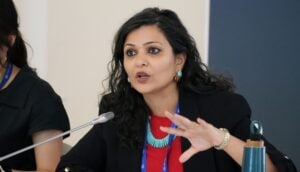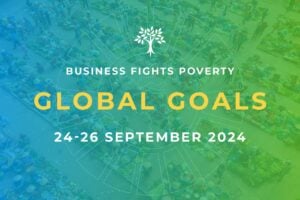There is a strong level of ambition for the post 2015 Development Agenda. It’s recognised that the challenges affecting people, the planet and prosperity are interrelated and call for integrated solutions. Bold, transformative steps and collective action are needed to deliver the SDGs and shift the world to a sustainable path.
Water provides a perfect example of the integrated nature of the issues. Water, sanitation and hygiene development, sustainable water management and freshwater conservation efforts all reinforce each other and are mutually dependent on each other to succeed. The inclusion of an integrated water and sanitation SDG (Goal 6) explicitly recognises this interconnectedness and sets out a framework for an integrated programme of action.
To deliver the goal there needs to be a step change in the way we manage our water resources. The challenge to secure the sustainable management of water for people, nature and businesses, is of such a scale that it can only be delivered through the collective action of all stakeholders delivering integrated solutions.
The question we now face is how we can we ensure that the vision is delivered? What role can businesses play in the implementation of the SDGs? What challenges are likely to be faced and how can they be overcome? What good practice can the private sector draw on?
Private sector engagement in SDG implementation
The evidence is quite clear that businesses face financial risks connected to water if we fail to deliver the ambition set out by the SDGs. We therefore believe that the private sector has an important role to play, and a clear interest in, supporting the implementation of the SDGs.
WWF is a strong advocate for responsible private sector engagement on water issues. There are however a number of challenges that businesses who want to engage in the implementation of the SDGs are likely to face.
Managing shared risks – this required a shift in focus from internal and supply chain management, where businesses have direct control, to collective action at a catchment scale. Here the control is indirect and the measures, focus, engagement and complexity change considerably.
Engaging in water governance – while many businesses might take the sub-goals of the SDG water goal as being about delivering safe drinking water and sanitation for employees or local communities, water efficiency in operations and supply chains, and dealing with effluent quality, our experience at WWF has shown that these goals will only be achieved by businesses engaging and influencing the governance of water. This is an uncomfortable place for many businesses.
Public perceptions of why companies are engaging – there is likely to be public mistrust in the motivations of businesses that advocate for changes to the governance of water resources.
Legitimacy of private sector advocacy – the water stewardship credentials of most businesses are currently not strong. There is a need for a company to have its own house in order before it can legitimately advocate for changes to water governance.
Unintended consequences – businesses need to be part of the solution but need to recognise that, wherever they are operating, there will be water management practitioners and stakeholders with many decades of experience, and governments with mandated priorities. Understanding the technical, social and political complexities in any location, working with existing programmes, and listening to and learning from stakeholders, rather than establishing parallel programmes is essential.
Overcoming the challenges using a water stewardship approach
WWF have been working with companies to develop our concept of water stewardship since 2009. We have created a five-step framework for corporate water stewardship which provides a robust approach that can be applied to help enable companies manage their water risks and engage in advocacy to support the sustainable management of water resources.
As part of our water stewardship work we have been working in a number of river basins demonstrating that by working with local government, the private sector and other stakeholders vital improvements in water resource management can be made. We recognise that more needs to be done to act on a scale and at a speed necessary to meet growing water related risks and have therefore developed ‘Water Stewardship Basins Strategies’ for 16 global river basins.
Join us on the 24th of June to discuss the lessons we have learnt from our water stewardship work that could be useful in helping businesses engage in the delivery of the SDG goals.
For those unable to make the session a range of guidance exists to help business apply the framework and navigate the challenges of legitimacy, transparency etc. Links to the key sources of information can be found in WWF-UK’s recently published report ‘From Risks to Resilience: does your business know its water risk?









